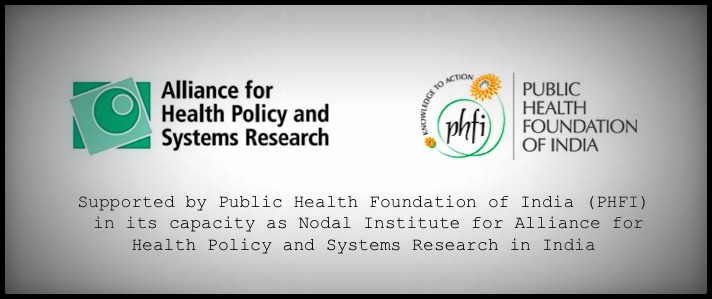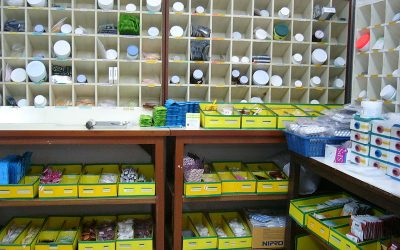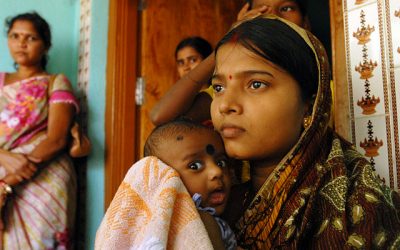HPSR Knowledge Platform

Health Policy & Systems Research (HPSR), is an emerging global field with its own evolving standards for creating, evaluating, and utilizing knowledge, and distinguished by a particular orientation towards influencing policy and wider action to strengthen health systems. It is widely recognized as a critical element of the action needed to achieve the health-focused Millennium Development Goals, strengthen primary health care, and advance towards Universal Health Coverage. The Alliance for Health Systems and Policy Research (ASHPR) at WHO has identified nodal institutes in several countries, housed in academic/research institutions which are critically engaged in Implementation Research (IR) and Health Policy & Systems Research (HPSR).A Nodal Institute serves as a resource for 7-10 academic/research institutions and decision-making bodies in its respective territory. The functions of the Nodal Institute include developing training programs for researchers, carrying out biannual mapping of health systems research and practice, collaborating with other IRP partners and initiatives, supporting scale up of effective interventions and promoting IR & HPSR..
India has a growing community of Health Policy & Systems Researchers with varied disciplinary antecedents in the social sciences and public health. Public Health Foundation of India (PHFI), is designated as the Nodal Institute for Health Policy and Systems Research for India by the AHPSR. As the Nodal Institute of the Alliance for Health Policy & Systems Research in India, PHFI has the mandate to support HPSR community and capacity development, extend collaborations with existing HPSR institutions and researchers and to facilitate the use of HPSR evidence by health system decision-makers in the country. PHFI, in partnership with premier HPSR organizations in India and inputs from other global leaders in the field, has contributed significantly to this mandate. So far the Nodal Institute has mapped national capacity for HPSR in India, held a series of interactions between researchers and policy makers, and initiated some critical dialogues with the health ministry towards realizing an institutionalized support environment for HPSR in India. It has convened as well as supported presence of Indian HPSR researchers in Global Health Systems Research Symposiums. It has also successfully launched a nationwide HPSR capacity building initiative “KEYSTONE” involving lead researchers and institutions involved in HPSR- 20 researchers identified through a rigorous selection process got trained under this initiative, by a group of faculty pooled from renowned HPSR institutions. It has facilitated involvement of several internationally known health systems and policy researchers and research initiatives for this process as well.
One of the mandates of the Nodal Institute project was to strengthen the existing networks and initiatives engaged in health systems research and dissemination of health systems knowledge. In this regard PHFI extended its support to Health Systems Research India Initiative (HSRII), for further strengthening its activities and initiatives. HSRII is one of the leading knowledge exchange platforms aimed at facilitating knowledge dissemination of health systems research as well as implementation research in India. Objective of this initiative is strengthening health systems through knowledge exchange and through implementing health systems initiatives in India. During the Third Health Systems Global Symposium held at Cape Town in 2014, HSRII received the first “Health Systems Global Social Media Award” for the best use of social media for informing, advocating and engaging for health systems. With the support of the Nodal Institute project, HSRII knowledge network is now being migrated into the current web based platform. The website based Knowledge Exchange Platform includes new initiatives such as (1) HPSR Blog, (2) HPSR Article-Watch, (3) HPSR News-Watch, (4) HPSR Event-Watch and (5) HPSR Newsletter; all these will facilitate optimum dissemination of health systems knowledge and strengthen the HPSR community interactions in the country.
In addition to its primary mandate of strengthening HPSR knowledge dissemination under this project, the HSRII has also provided data collection interface and technical assistance to the Nodal Institute team for conducting and managing the first National Survey of organizations engaged in HPSR – as a first survey of its kind in the country, this helped in identifying various issues and concerns related to HPSR capacities in the country.
We will be happy to have your valuable feedbacks on the newly built up web interface and its utility. Our sincere thanks to the AHPSR Nodal Institute team at PHFI, for their support to make this happen.
Latest Updates
Article Watch, Event Watch, Blogs etcWhat drives inappropriate antibiotic dispensing? A mixed-methods study of pharmacy employee perspectives in Haryana, India
Anna K Barker et al Abstract Objectives There are only 0.70 licensed physicians per 1000 people in India. Thus, pharmacies are a primary source of healthcare and patients often seek their services directly, especially in village settings. However, there is wide...
Cost of Delivering Health Care Services in Public Sector Primary and Community Health Centres in North India
Shankar Prinja et al PLOS One, 2016 Background With the commitment of the national government to provide universal healthcare at cheap and affordable prices in India, public healthcare services are being strengthened in India. However, there is dearth of cost data...
What is the role of community capabilities for maternal health?
What is the role of community capabilities for maternal health? An exploration of community capabilities as determinants to institutional deliveries in Bangladesh, India, and Uganda Ligia Paina et al BMC Health Services Research,2016 Background While community...
Availability of Medicines in Public Sector Health Facilities of Two North Indian States
Dear All Access to medicines is cited as a low-hanging fruit to reduce the financial burden for curative are, especially in public sector facilities. Attached is the paper which presents a baseline situation in terms of "Availability of Medicines in Public Sector...
Cost Effectiveness of IMNCI Program in India
Dear All PFA a paper on cost effectiveness of IMNCI program in India. Hope you find this relevant. Regards Shankar Dr. Shankar Prinja MD, DNB, MSc Associate Professor of Health Economics School of Public Health Post Graduate Institute of Medical Education and Research...
EPW Articles on NSSO 71st round on Morbidity and Costs of Healthcare
Dear All, Please find attached three EPW articles based on the NSSO 71st round. (1) ‘Falling Sick, Paying the Price: NSS 71st Round on Morbidity and Costs of Healthcare (2) NSSO 71st Round Same Data, Multiple Interpretations (3) NSSO 71st Round Data on Health and...
Direct Observation of Treatment Provided by a Family Member as Compared to Non-Family Member among Children with New Tuberculosis: A Pragmatic, Non-Inferiority, Cluster-Randomized Trial in Gujarat, India
Direct Observation of Treatment Provided by a Family Member as Compared to Non-Family Member among Children with New Tuberculosis: A Pragmatic, Non-Inferiority, Cluster-Randomized Trial in Gujarat, India Paresh Vamanrao Dave et al PLOS ONE Abstract Background The...
Systematic Review Publication on factors influencing uptake and renewal of CBHI schemes in LMICs
Dear All I am sending across the 3ie SR on factors influencing uptake and renewal of CBHI schemes in LMICs. The objective of this systematic review is to review and analyse the literature reporting empirical evidence on voluntary uptake in CBHI schemes in low- and...
National Framework for Malaria Elimination in India (2016–2030)
National Framework for Malaria Elimination in India (2016–2030) MOHFW, GOI & WHO February 2016 VISION Eliminate malaria nationally and contribute to improved health, quality of life and alleviation of poverty. GOALS In line with the WHO Global Technical Strategy...
Has the Rajiv Aarogyasri Community Health Insurance Scheme of Andhra Pradesh Addressed the Educational Divide in Accessing Health Care?
Has the Rajiv Aarogyasri Community Health Insurance Scheme of Andhra Pradesh Addressed the Educational Divide in Accessing Health Care? Mala Rao et al PLOS One Equity of access to healthcare remains a major challenge with families continuing to face financial and...



